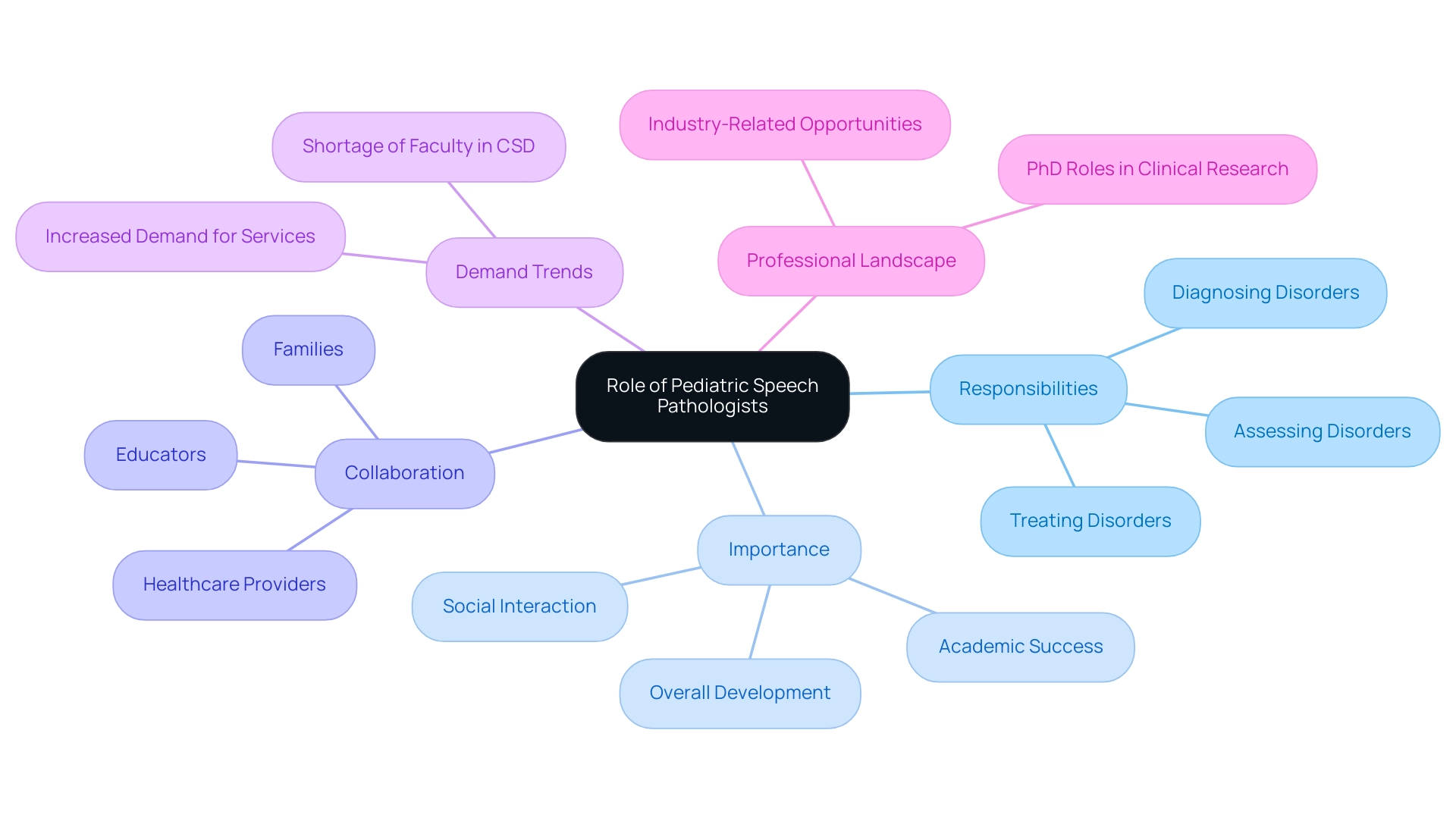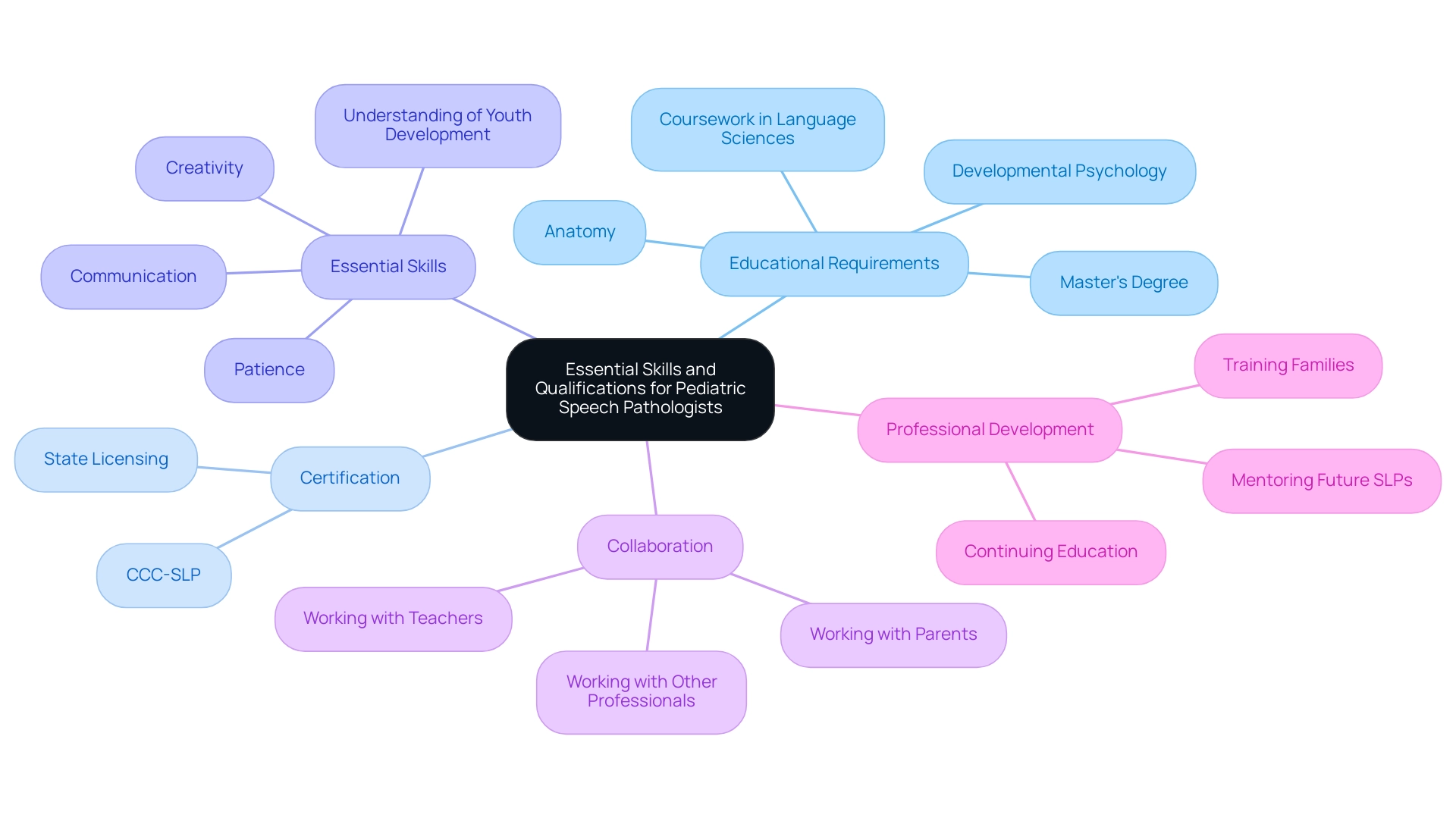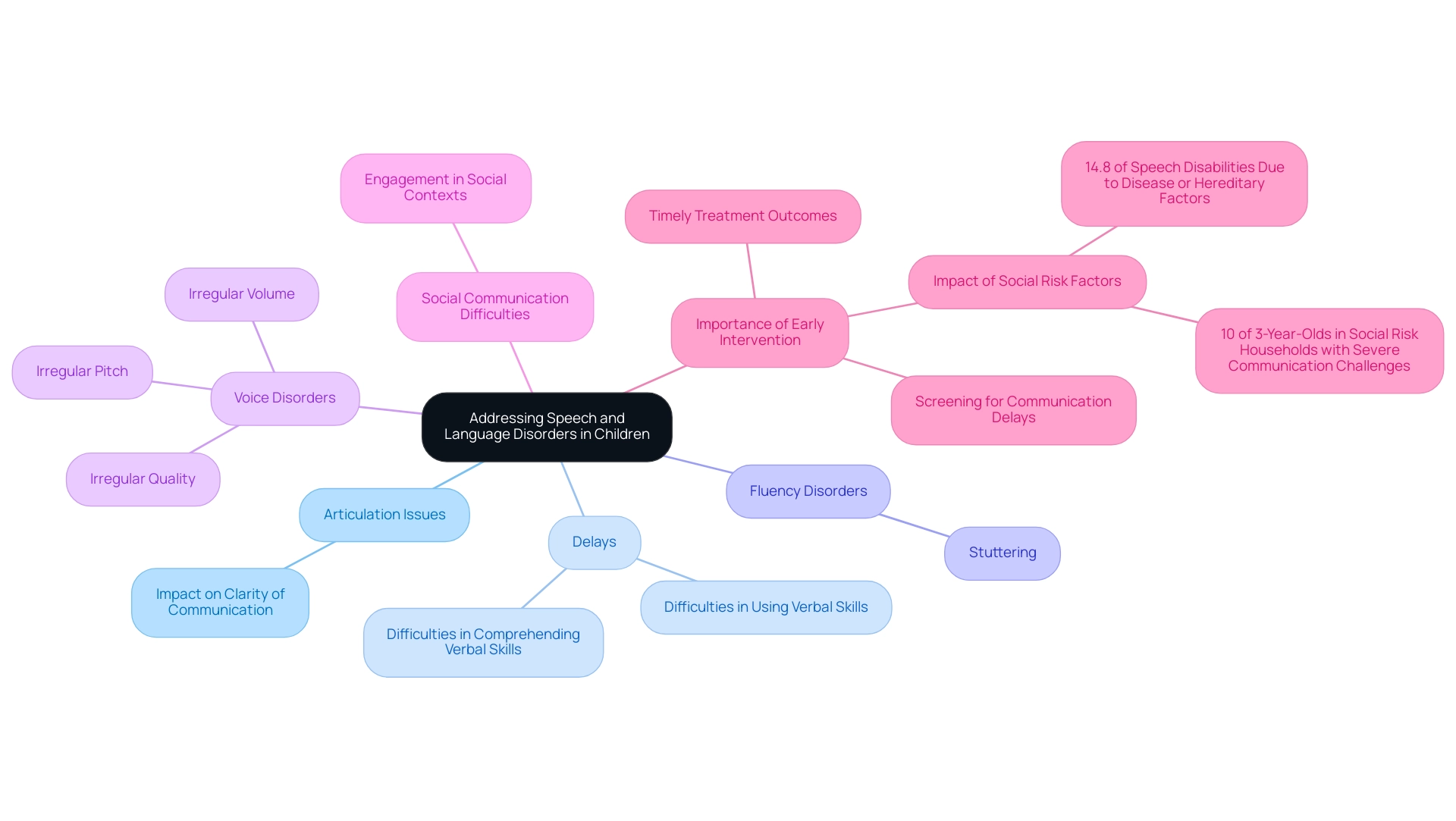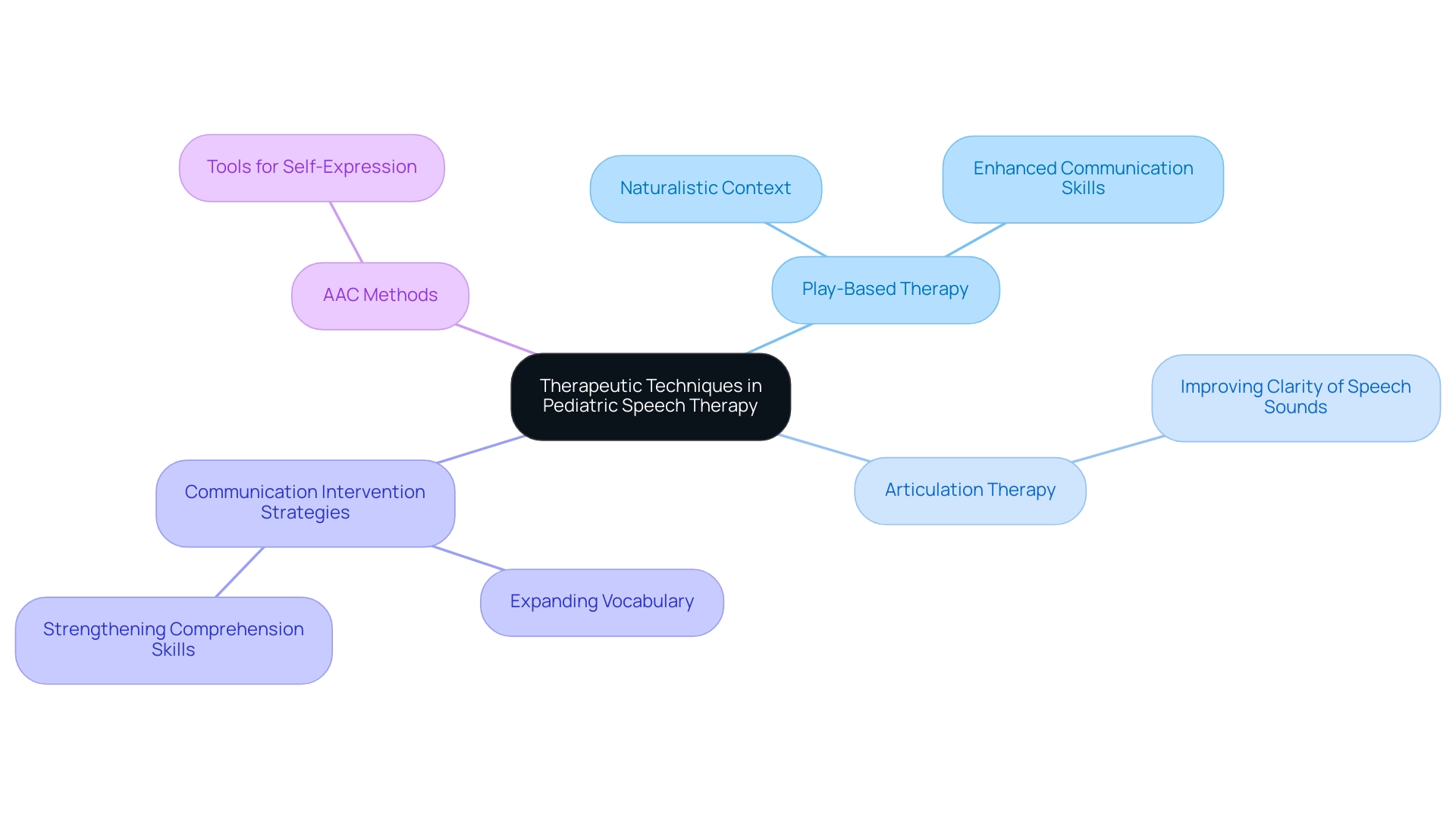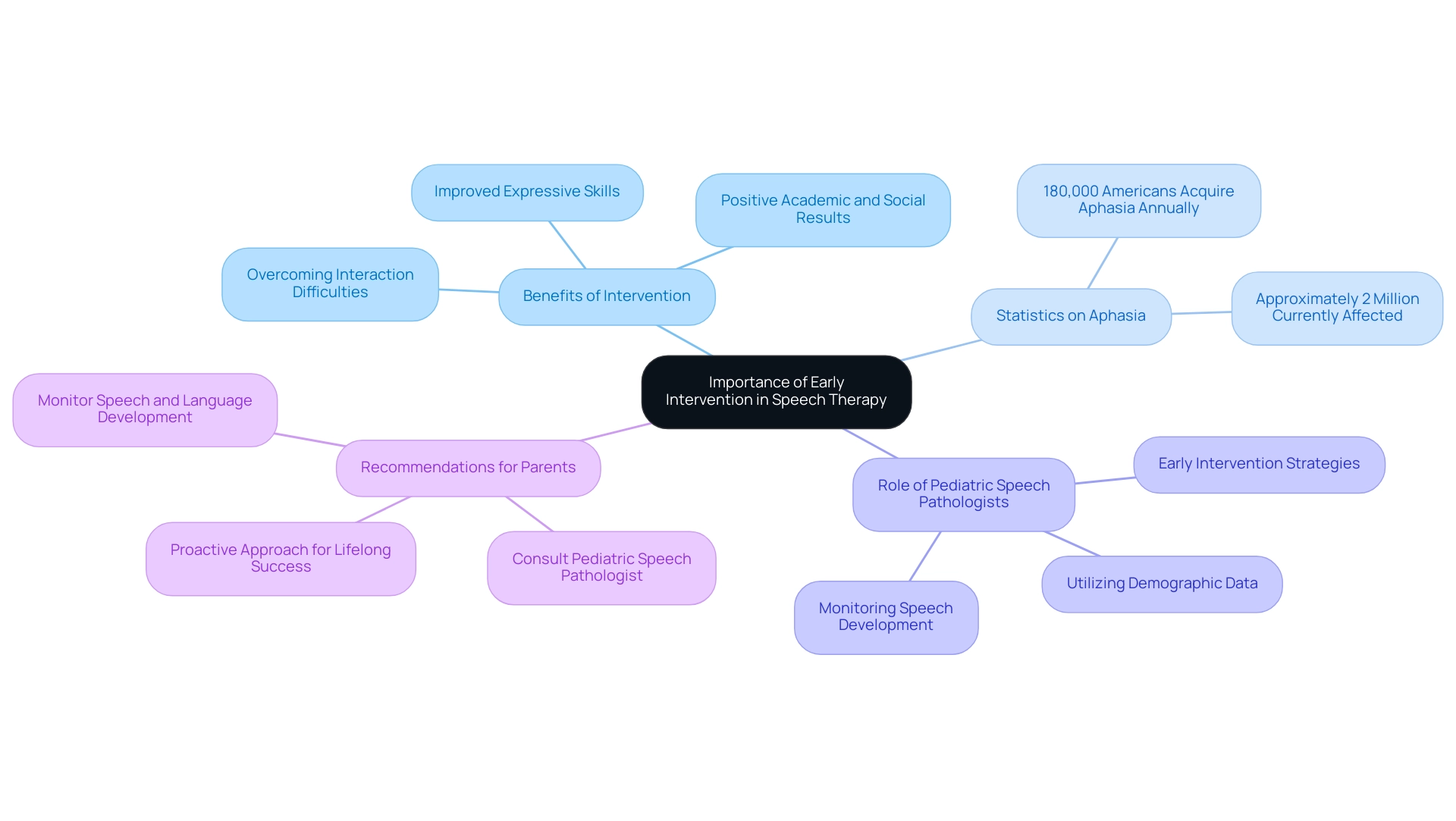Introduction
The role of pediatric speech pathologists is increasingly recognized as vital in the development of effective communication skills among children. These specialists are not only tasked with diagnosing and treating speech and language disorders but also play a crucial part in fostering social interactions and academic success. With a growing demand for their services, understanding the qualifications, skills, and therapeutic techniques employed by these professionals becomes essential.
This article delves into the multifaceted responsibilities of pediatric speech pathologists:
- The importance of early intervention
- The various strategies they utilize to support children facing communication challenges
- Highlighting the profound impact of their work on child development and well-being
1. Defining the Role of Pediatric Speech Pathologists
A pediatric speech pathologist is a specialized expert committed to assessing, diagnosing, and treating speech and communication disorders in young individuals, ranging from infancy through adolescence. They tackle various issues, including articulation, fluency, voice quality, and language comprehension. The importance of their role goes beyond simple communication; effective communication is essential to a young person's social interaction, academic success, and overall development.
These specialists collaborate closely with families, educators, and other healthcare providers to devise tailored intervention plans that cater to each child's unique needs. As noted by an expert in the field,
SLPs work closely with professionals and families to provide culturally and linguistically responsive supports and services.
Furthermore, the expected shortage of faculty in Communication Sciences and Disorders (CSD) departments emphasizes the increasing demand for pediatric language pathologists and the significance of encouraging higher education careers in the field. Furthermore, the professional landscape is evolving, with PhD holders finding roles in hospitals or clinics focused on clinical research or in industry-related organizations for product research and development. These dynamics are further complicated by economic factors, as evidenced by the recent 0.1% increase in the U.S. Import Price Index, which may affect healthcare services, including therapy.
2. Essential Skills and Qualifications for Pediatric Speech Pathologists
To pursue a career as a pediatric speech pathologist, individuals typically need to obtain a master's degree in speech-language pathology, which encompasses coursework in essential subjects like language sciences, anatomy, and developmental psychology. This academic foundation is complemented by supervised clinical practice, a critical component that ensures hands-on experience in the field. Moreover, licensure and certification from relevant professional organizations, such as the American Speech-Language-Hearing Association (ASHA), are mandatory to practice legally.
The Certificate of Clinical Competence in Speech-Language Pathology (CCC-SLP) is recognized as the industry standard for professional certification, underscoring the importance of meeting rigorous credentialing standards. As highlighted in the case study titled 'Licensing and Credentialing for Speech Therapists,' individuals must meet requirements set by state licensing boards and national certification standards to ensure they have the necessary skills to provide quality care. Key skills essential for success as a pediatric speech pathologist include:
- Exemplary communication abilities
- Patience
- Creativity
- A comprehensive understanding of development in youth
Furthermore, pediatric speech pathologists collaborate with parents, teachers, and other professionals to create personalized treatment plans for young patients, emphasizing the cooperative nature of their profession. As the field evolves, continuous professional development becomes paramount, enabling practitioners to remain informed about the latest research and therapeutic techniques. According to the Bureau of Labor Statistics, the median annual salary for language therapists is $89,290, reflecting the demand and value of qualified professionals in this essential area of youth development.
3. Addressing Speech and Language Disorders in Children
Pediatric speech pathologists play an essential role in tackling a variety of verbal and linguistic disorders, which include:
- Articulation issues that impact the clarity of communication
- Delays where young individuals encounter difficulties in comprehending or using verbal skills effectively
- Fluency disorders such as stuttering
Furthermore, pediatric speech pathologists assist individuals with:
- Voice disorders characterized by irregular pitch, volume, or quality
- Social communication difficulties that hinder their ability to engage appropriately in social contexts
The significance of early identification and intervention by a pediatric speech pathologist for these disorders cannot be overstated; research indicates that timely treatment leads to markedly improved outcomes.
As Dr. John B. Wong highlights, 'Screening for communication delays and disorders in youngsters is essential for effective intervention by a pediatric speech pathologist.' In Australia, for instance, factors such as disease, illness, or hereditary influences accounted for 14.8% of speech disabilities in youth as of 2018. Additionally, studies have demonstrated that children from households experiencing social risk factors, such as low income or inadequate prenatal care, often require support from a pediatric speech pathologist due to their higher rates of communication delays.
Specifically, 10% of 3-year-olds in such environments encounter
severe communication challenges, highlighting the critical need for early screening and intervention strategies provided by a pediatric speech pathologist. This case study on the social determinants of health and communication disorders underscores how external factors significantly influence verbal skills development, with a focus on the critical role of a pediatric speech pathologist in addressing the broader implications of these disorders on quality of life and social interaction.
4. Therapeutic Techniques Employed in Pediatric Speech Therapy
Pediatric speech pathologists utilize a varied range of therapeutic methods tailored to address the individual requirements of every young person. Among these, play-based therapy stands out as a particularly effective method, involving young individuals in activities that promote communication and language growth within a naturalistic context. This method is not only enjoyable for young ones but also significantly enhances their communication skills.
Involving young individuals and encouraging parental engagement are vital elements that
improve the effectiveness of therapy, as active participation can result in better outcomes. In addition to play-based therapy, the pediatric speech pathologist utilizes articulation therapy to improve the clarity of speech sounds, while communication intervention strategies focus on expanding vocabulary and strengthening comprehension skills. For individuals facing severe communication challenges, augmentative and alternative communication (AAC) methods are introduced, equipping them with essential tools for effective self-expression.
According to James Law, a leading expert in the field, 'It has recently been reported that approximately two children in every class of 30 pupils will experience language disorder severe enough to hinder academic progress.' This statistic underscores the urgent need for timely and effective interventions. Furthermore, current trends indicate a growing emphasis on play-based therapy in pediatric language therapy, which is often utilized by pediatric speech pathologists, with numerous case studies showcasing its positive outcomes.
For example, the case study titled 'Diagnosis and Early Intervention' emphasizes that early identification by pathologists is essential for effective treatment of communication disorders, utilizing play-based activities and verbal tasks for evaluation. This approach has led to significantly improved results in therapy, emphasizing the importance of timely intervention.
5. The Importance of Early Intervention in Speech Therapy
Prompt intervention by a pediatric speech pathologist in language therapy is crucial, as it greatly enhances a child's expressive skills. Research shows that nearly 180,000 Americans acquire aphasia each year, with an estimated 2 million currently affected; this underscores the necessity for proactive support. Children who receive prompt language therapy interventions provided by a pediatric speech pathologist are more likely to overcome interaction difficulties and achieve positive academic and social results.
Such interventions enable pediatric speech pathologists to tackle issues before they become entrenched, facilitating the development of essential communication skills. The Department of Education emphasizes, "Making use of
existing demographic data in this way can help state Part C programs better identify and serve individuals who need the support provided through early intervention services." This emphasizes the essential function of data in providing suitable assistance for youth.
Furthermore, studies included in systematic reviews that scored 70% or more on quality assessments confirm the effectiveness of early intervention strategies. Consequently, parents and caregivers are encouraged to closely monitor their offspring's speech and language development and to consult a pediatric speech pathologist when concerns arise. This proactive approach not only aids in effective communication but also sets the foundation for lifelong success, particularly in the context of comprehensive support systems for children with autism.
Conclusion
Pediatric speech pathologists are integral to the development of communication skills in children, addressing a wide array of speech and language disorders. Their role encompasses not just diagnosis and treatment, but also collaboration with families and educators to create tailored intervention plans that meet each child's unique needs. The increasing demand for these specialists highlights the importance of early intervention, which is proven to lead to better outcomes for children facing communication challenges.
The qualifications required for pediatric speech pathologists, including advanced degrees and relevant certifications, ensure that practitioners possess the necessary skills to provide effective care. Their expertise in various therapeutic techniques, such as play-based therapy and articulation strategies, enables them to engage children in meaningful ways, fostering both enjoyment and learning. As the landscape of speech therapy evolves, ongoing professional development remains crucial for these specialists to stay informed about the latest research and practices.
Ultimately, the work of pediatric speech pathologists extends beyond speech improvement; it significantly impacts a child's overall development, social interaction, and academic success. By prioritizing early intervention and utilizing effective therapeutic techniques, these professionals play a vital role in shaping the future of children with communication difficulties. Recognizing and supporting the contributions of pediatric speech pathologists is essential for fostering healthier, more communicative environments for all children.
